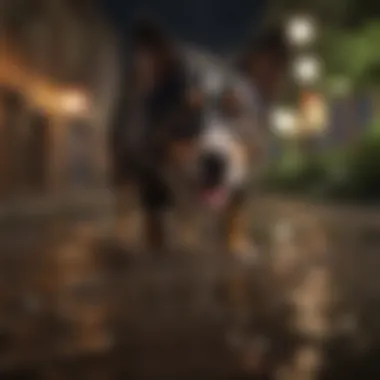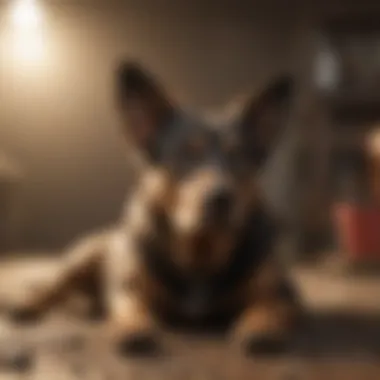Understanding Nighttime Diarrhea in Dogs: Causes & Solutions


Intro
Diarrhea at night can be troublesome for both dogs and their owners. Understanding the underlying causes is essential for effective management and care. This section will highlight the main aspects regarding canine digestive health, focusing on what triggers nighttime diarrhea and how to address this issue further.
Understanding Your Pet
Breed Traits
Certain dog breeds may have predispositions to gastrointestinal issues. For instance, breeds like the German Shepherd and Boxer often experience digestive sensitivities. Understanding these traits can help owners anticipate potential problems related to diarrhea, especially during nighttime.
Common Temperaments
A dog’s temperament can play a role in their digestive health. Stress or anxiety is a common trigger for gastrointestinal disturbances. For example, anxious dogs may experience diarrhea when left alone at night. Recognizing behavioral traits can inform pet owners on how to mitigate stressors in their dog's environment.
Special Needs
Some dogs have special dietary requirements which, if not met, can lead to digestive upset. Dogs with food intolerances or allergies may be particularly sensitive to certain ingredients. It is crucial to identify these needs early in order to prevent instances of diarrhea, especially during the night.
Pet Care Essentials
Nutrition and Feeding Guidelines
Proper nutrition greatly impacts overall health and can influence bowel regularity. Feeding dogs a balanced diet suited to their age and breed can prevent digestive issues. Owners should consider high-quality commercial food or a vet-recommended homemade diet to meet their dog's specific needs. Pay attention to portion sizes and avoid sudden diet changes, which can disrupt the digestive system.
Grooming Tips and Techniques
Although grooming might seem unrelated, maintaining good hygiene can prevent conditions that lead to diarrhea. Regular bathing and cleaning around the dog's rear can help prevent infections and irritation, which might contribute to digestive issues.
Health and Wellness
Routine veterinary check-ups play a crucial role in keeping a dog healthy. Regular vaccinations and parasite control can reduce the risk of diarrhea caused by infections. Awareness of your dog’s health condition can aid in timely responses when symptoms arise.
Training and Behavior
Basic Training Techniques
Successful house training is vital in reducing stress and preventing nighttime accidents. Establish a consistent schedule for bathroom breaks, especially before bedtime. This consistency develops a routine that comforts your pet, which in turn can ease digestive issues at night.
Behavioral Problems and Solutions
Address any behavioral issues early on. A dog that exhibits fear or anxiety may also develop digestive issues. Training should focus on creating a safe environment for your dog where they feel secure during the night. Consider techniques such as crate training to provide a comforting space.
Mental Stimulation Activities
Engaging your dog mentally can reduce stress, thus potentially improving digestion. Activities like puzzle toys or obedience training can keep a dog's mind active, preventing anxiety-related gastrointestinal upset.
Engaging with Your Pet
Interactive Games and Toys
Games promote bonding and reduce anxiety. Playing fetch or tug-of-war can divert attention from stressors and contribute positively to a pet’s mood. Ensuring your dog has toys that challenge their intellect can also help in reducing nighttime stress.
Safe Outdoor Activities
Regular outdoor activity is crucial for a dog’s overall well-being. A well-exercised dog is likely to have reduced anxiety levels. Activities such as hiking, running, or simply strolling can foster a sense of calm that might help their digestive system function more effectively.
Family-Friendly Pet Interactions
Involving family members in pet care can create a supportive environment for the dog. Positive interactions with family members can mitigate stress, leading to better overall health and wellbeing. It can be helpful to create a routine that all family members follow to ensure consistent care.
Pet Adoption and Integration
Choosing the Right Pet for Your Lifestyle
Potential pet owners need to consider their lifestyle before adopting dogs. If you lead an active life, consider adopting breeds that thrive on activity and companionship. Selecting the right breed can minimize issues like nighttime diarrhea.
Preparing Your Home for a New Pet
Preparation is key in ensuring a smooth transition for a new pet. Ensuring a safe space with access to necessities can ease a dog's stress during their first nights in a new home, thereby reducing the likelihood of gastrointestinal upset.


Tips for Smooth Prolusion
Introduce your new pet to the family gradually. Allow them to adjust slowly to their new environment. A gentle approach can minimize anxiety, which in turn supports better digestive health. Show patience and understanding as they adapt.
A well-structured care routine not only benefits the dog's health but also enhances the owner's understanding of their pet's serious conditions.
Overview of Diarrhea in Dogs
Diarrhea in dogs is a significant topic that pet owners need to understand. It involves more than just loose stools; it can indicate a variety of health issues. Knowing the details of diarrhea aids in pinpointing the cause and determining the appropriate response. Pet owners can prevent serious health complications by understanding the signs and symptoms. This knowledge is vital for ensuring their dog's well-being.
Definition of Diarrhea
Diarrhea is defined as an increase in the frequency, fluidity, or volume of stools. For dogs, this condition often results in loose or watery feces. It can be acute, happening suddenly and lasting for a short time, or chronic, persisting for weeks. Recognizing diarrhea early is essential for addressing it effectively. Ignoring the symptoms may lead to dehydration, which is a serious condition, especially in younger or older dogs.
Normal vs.
Abnormal Stool
To effectively assess diarrhea, it is crucial to understand the distinction between normal and abnormal stool. Normal dog stools are firm, moist, and well-formed, having a chocolate-brown color. Abnormal stool varies in appearance and can indicate health issues.
- Normal Stool Characteristics:
- Abnormal Stool Characteristics:
- Firm texture
- Moist but not wet
- Consistent chocolate-brown color
- Watery or loose consistency
- Presence of blood or mucus
- Unusual colors such as yellow or green
Being able to distinguish these differences can empower pet owners to act promptly. This could mean simple dietary adjustments, or it may necessitate a visit to the veterinarian for more serious underlying issues.
Nighttime Diarrhea: Characteristics
Understanding the characteristics of nighttime diarrhea in dogs is essential for pet owners. This knowledge helps in identifying underlying problems, choosing appropriate interventions, and determining when professional help is needed. Nighttime diarrhea can impact the dog's overall health and quality of life.
Symptoms to Observe
Observing symptoms of diarrhea in dogs is crucial. Common symptoms include:
- Loose stools: The most obvious indicator. This may vary in consistency.
- Increased urgency: The dog might need to go outside more frequently at night.
- Straining: Difficulty in passing stools can indicate gastrointestinal distress.
- Bloating or gas: This may accompany diarrhea, leading to discomfort.
- Vomiting: If present, it could suggest a more serious problem.
It's important to monitor the situation closely. A dog experiencing prolonged symptoms may require veterinary attention.
Frequency and Timing
The frequency and timing of nighttime diarrhea can reveal significant information about a dog's condition. Consider the following aspects:
- Onset of symptoms: Is the diarrhea sudden or gradual? A sudden onset may suggest dietary indiscretion or infections.
- Time of occurrence: Does the diarrhea happen consistently at a specific time, or is it random? Patterns can help identify triggers.
- Duration: How long does the diarrhea last? Short episodes may resolve on their own. However, persistent diarrhea lasting more than 24 hours needs veterinary assessment.
Understanding these characteristics allows pet owners to provide accurate information to their veterinarian. By recognizing patterns and symptoms, appropriate measures can be implemented to ensure the dog’s recovery.
Common Causes of Nighttime Diarrhea
Understanding the common causes of nighttime diarrhea in dogs is critical for pet owners. Recognizing these causes can lead to prompt treatment and better management of the condition. Many factors contribute to this issue, and awareness can significantly impact a dog's well-being. In this section, we will explore several key factors that might cause your dog to experience diarrhea at night.
Dietary Indiscretion
One of the most frequent reasons for nighttime diarrhea is dietary indiscretion. This term refers to the behavior of dogs consuming things they should not, such as spoiled food or human food not suitable for them. Dogs often scavenge or even steal food when not supervised.
Owners should be vigilant about what their dogs can access. Foods like chocolate, grapes, and onions are toxic to dogs. Even benign-looking table scraps can disturb their digestive systems. History of dietary indiscretion often leads to symptoms appearing in the night, when the dog might be relaxed after a day of activity.
Food Sensitivity and Allergies
Food sensitivities and allergies can trigger gastrointestinal upset in dogs. Not all dogs have the same dietary needs, and some may react negatively to certain ingredients. Common allergens include beef, chicken, dairy, and wheat.
When a dog consumes something it is allergic to, its body may react by causing inflammation in the digestive tract, leading to diarrhea, especially at night when the body is in rest mode. If you suspect that your dog has a food sensitivity, an elimination diet under veterinary supervision can help identify the culprit.
Infections and Parasites
Canine diarrhea can also be attributed to infections and parasites. Many types of bacteria, viruses, and parasitic organisms can invade a dog's gastrointestinal tract. Common examples include giardia and parvovirus. These infections are often accompanied by other symptoms, such as vomiting or lethargy.
When dealing with infections, diarrhea can become more severe at night due to decreased activity and digestion slowing down during rest periods. If you observe additional symptoms, a veterinary visit is crucial for accurate diagnosis and treatment.


Systemic Health Issues
Systemic health issues can also lead to nighttime diarrhea. Various conditions, such as liver or kidney disease, can disrupt normal digestion. These issues often lead to a host of other symptoms, ranging from weight loss to increased thirst.
In cases of systemic health problems, diarrhea may appear as the body struggles to cope with its underlying health condition. Regular veterinary check-ups can help catch these issues early, and treatment plans can be established to mitigate the impact on your dog's health.
Always consult with a veterinarian if you notice any changes in your dog's stool pattern, especially if they occur during the night. Early intervention can lead to improved outcomes and overall health for your pet.
Less Common Causes of Nighttime Diarrhea
Understanding less common causes of nighttime diarrhea in dogs is crucial. Many pet owners immediately think of dietary issues or infections. However, there are other factors that can influence a dog’s digestive health, especially during the night. Recognizing the varied causes can lead to more effective management and treatment of the condition.
Stress and Anxiety
Stress and anxiety can significantly impact a dog's gastrointestinal system. Dogs, like humans, may experience digestive disturbances when under emotional distress. Factors such as changes in the environment, new family members, or even loud noises can trigger anxiety in dogs. This emotional state can result in diarrhea, particularly at night when they may feel more vulnerable.
Many pet owners underestimate the effect that stress has on their pets. A dog might not just experience behavioral changes but also physical symptoms. If a dog has an anxiety episode, it might show associated signs like pacing or excessive barking, leading to digestive upset.
Pet owners should monitor their dog's behavior closely. Implementing calming strategies, such as creating a safe space or using anxiety-reducing products, can help alleviate these symptoms. If stress or anxiety continues to be an issue, consulting a veterinarian is recommended.
Medications and Treatments
Certain medications can have side effects that include gastrointestinal upset. For instance, antibiotics, which are often prescribed for infections, may disrupt the natural balance of gut bacteria. This disruption can lead to diarrhea, particularly if the medication is administered at night.
Other treatments, such as anti-inflammatory drugs or steroids, might also be culprits. They can affect the digestive lining, which may result in diarrhea as well. Understanding the medications your dog is taking is essential. Owners should read the accompanying information carefully and discuss potential side effects with their veterinarian.
- Consider keeping a log of any medications your dog is on, along with their effects on bowel movements.
- Report any changes in your dog’s condition to the vet immediately.
Age-Related Concerns
As dogs age, their bodies undergo various changes that can affect their digestive systems. Senior dogs may become more sensitive to certain foods or diets they previously tolerated well, leading to irregular bowel movements, including diarrhea at night.
Older dogs may also develop diseases such as kidney issues or hormonal imbalances. These medical conditions can manifest as gastrointestinal disturbances. Regular veterinary check-ups become even more critical as dogs enter their senior years to catch these issues early.
In summary, while dietary indiscretions and infections are common causes of nighttime diarrhea, it is essential to consider less common factors such as stress, medications, and age-related changes. By understanding these elements, pet owners can better address the problem and ensure the well-being of their furry friends.
Diagnosis and Assessment
Diagnosing and assessing nighttime diarrhea in dogs is crucial for effective treatment. It helps pinpoint underlying causes and informs treatment strategies. Understanding this aspect provides pet owners valuable insight to respond effectively.
Veterinary Examination
A thorough veterinary examination is often the first step in addressing nighttime diarrhea. The veterinarian will assess your dog’s health through different methods. This includes evaluating the dog's history and any recent changes in behavior or diet.
During the examination, the veterinarian might ask specific questions about the dog's symptoms. These include the frequency of diarrhea, the consistency of the stool, and any accompanying symptoms like vomiting or lethargy. This detailed inquiry helps connect the dots and form a clearer picture of possible causes.
Moreover, a physical examination is vital. The vet will check for signs of dehydration, weight loss, or any abdominal discomfort. These factors can indicate the severity of the situation and may influence the direction of further diagnostics or treatments.
Diagnostic Tests
Sometimes, the cause of diarrhea is not immediately apparent. In such cases, diagnostic tests become a necessary component of the evaluation. These tests help identify precise issues affecting your dog’s digestive health.
Stool Analysis
Stool analysis plays a key role in diagnosing nighttime diarrhea. This test examines the stool sample for parasites, bacteria, or abnormal components. It is a common and effective choice for veterinarians.
One significant characteristic of stool analysis is its ability to identify infections caused by parasites like giardia or worms. Recognizing these issues can lead to targeted treatment quickly. However, while stool analysis is beneficial, it has limitations. Some underlying medical conditions may not be detectable through this test alone. Therefore, it often needs to be performed alongside other diagnostic methods.
Blood Tests
Blood tests provide important insights into your dog’s overall health. They can reveal signs of infection, inflammation, or even organ dysfunction, all relevant to gastrointestinal issues. These tests are typically simple and require a few drops of blood from your pet.
Blood tests can identify imbalances in electrolytes or count white blood cells that may indicate infection or stress. However, these tests must be interpreted within the larger context of a comprehensive assessment. In some cases, blood tests alone may not provide enough information about the cause of diarrhea.
Imaging Studies
Imaging studies like X-rays or ultrasound are advanced diagnostic tools to consider as well. These tests allow for a visual examination of the intestines and surrounding organs. They can help identify structural abnormalities or blockages that could be contributing to diarrhea.
The key characteristic of imaging studies is their ability to provide a view inside the body. This unique feature is advantageous for understanding complex gastrointestinal problems. However, these tests may not be suitable for all patients due to anesthesia requirements or cost considerations. Therefore, they are usually recommended when other tests are inconclusive.


Treatment Options
Understanding treatment options for nighttime diarrhea in dogs is crucial for pet owners seeking relief for their furry friends. Proper treatment can significantly improve a dog’s health and comfort, leading to better quality of life. It’s important to note that different underlying causes may necessitate varied approaches. Addressing the issue comprehensively includes modifications in diet, use of medications, and ensuring hydration.
Dietary Management
Dietary management plays a pivotal role in treating diarrhea. A dog's diet can often be the source of gastrointestinal upset. Transitioning to a bland diet, such as boiled chicken and rice, may provide immediate relief. This simple meal is usually easy to digest and often well-accepted by dogs with sensitive stomachs.
It is also essential to identify potential food triggers. Keeping a food diary can help pinpoint any recent dietary changes that correlate with the onset of symptoms. If a dog has food allergies or sensitivities, switching to a hypoallergenic diet may drastically reduce diarrhea episodes. Consulting a veterinarian about a suitable food plan tailored to the specific dog is advisable.
Medications
In some cases, medications are necessary to manage diarrhea effectively. Antidiarrheal drugs like loperamide may be prescribed. Additionally, the veterinarian might recommend probiotics, which can aid in restoring the natural gut flora disrupted by diarrhea.
It is crucial to avoid over-the-counter medications without a vet’s guidance. Some medications suitable for humans could pose risks for dogs, leading to further complications rather than solutions. Thus, any medication should be administered under veterinary supervision to ensure safety and efficacy.
Hydration and Electrolyte Balance
Ensuring adequate hydration and maintaining electrolyte balance is vital when treating diarrhea in dogs. Diarrhea can rapidly lead to dehydration, especially in young or senior dogs. Providing access to fresh water at all times is the first step to prevent dehydration. In more serious cases, electrolyte solutions designed for pets may be necessary. These solutions help replenish lost salts and minerals.
Recognizing symptoms of dehydration, such as dry gums and lethargy, is crucial. If a dog shows signs of significant dehydration, immediate veterinary attention is necessary. In some cases, intravenous fluids may be required to restore hydration and electrolyte levels effectively.
Proper treatment and prevention strategies can dramatically improve a dog's health situation. Always consult with a veterinarian for tailored advice and guidance.
Prevention Strategies
Preventing nighttime diarrhea in dogs requires a multifaceted approach. Understanding and implementing effective prevention strategies is crucial for dog owners. This not only protects canine health but also enhances the overall quality of life for both pets and their owners.
Dietary Considerations
Diet plays a significant role in maintaining your dog's digestive health. Providing a balanced and nutrient-rich diet can help prevent gastrointestinal issues, including diarrhea. Consider the following points when managing your dog's diet:
- Quality of Food: Choose high-quality dog food that contains appropriate nutrients. Ingredients should be easy to digest. Avoid products with artificial additives.
- Gradual Changes: If you decide to change your dog's diet, do so gradually. Sudden changes can lead to upset stomachs and subsequent diarrhea. Mix new food with the old for about a week before making a full switch.
- Regular Feeding Schedule: Maintain a consistent feeding schedule. Feeding your dog at the same times daily helps regulate their digestive system.
- Limit Treats: Be mindful of treats and snacks. Offering too many can upset their digestion. Select healthy options.
Ensuring your dog receives a well-balanced diet tailored to their specific needs is one of the most effective ways to prevent diarrhea.
Routine Veterinary Care
Regular veterinary visits are essential for maintaining your dog's health. These check-ups provide several preventive benefits:
- Health Screenings: Routine exams can identify underlying health issues that may contribute to diarrhea.
- Vaccinations: Staying current on vaccinations helps dog avert various infections and illnesses.
- Dental Health: Dental care is often overlooked. Poor dental hygiene can lead to systemic health problems, affecting digestion.
Scheduling consistent veterinary care is not only about treating illness but also about identifying potential health risks before they become severe.
Managing Stress and Anxiety
Stress and anxiety can significantly impact a dog’s digestive health. Dogs can exhibit behavioral changes when under stress, which can trigger diarrhea. Here are strategies to reduce their anxiety:
- Create a Safe Space: Provide a quiet and comfortable area for your dog. This habitat will allow them to retreat when feeling anxious.
- Regular Exercise: Ensuring your dog gets enough physical activity can reduce pent-up energy and anxiety.
- Calm Routine: Maintain a calm environment, especially during loud events like storms or fireworks. Sometimes a simple change in your dog's routine can provide comfort.
Addressing stress is essential for minimizing gastrointestinal upset in dogs.
Applying these prevention strategies requires attention from pet owners, along with ongoing commitment. By focusing on diet, veterinary care, and emotional wellbeing, pet owners can proactively protect their dogs from nighttime diarrhea.
When to Seek Veterinary Help
Recognizing when to seek veterinary assistance is crucial for pet owners dealing with nighttime diarrhea in dogs. Timely intervention can address underlying health conditions before they worsen. This section focuses on persistent symptoms and additional warning signs that indicate the necessity of a veterinary visit.
Persistent Symptoms
Persistent diarrhea is defined as any episode of diarrhea lasting more than 24 hours. If your dog experiences frequent bouts of this condition during the night, it can lead to dehydration and other systemic issues. Owners should monitor the frequency and consistency of stools closely.
Here are some important factors to consider:
- Duration: If the diarrhea lasts beyond a day, it is time to consult a veterinarian.
- Frequency: Multiple episodes within a single night, especially when combined with lethargy, require immediate attention.
- Fecal Characteristics: Pay attention to the color, presence of blood, or unusual odor, as these can indicate infection or serious illness.
Ignoring these signs may lead to complications. Dehydration in dogs can occur rapidly, especially in young or elderly animals. Thus, understanding the timing and severity of symptoms is vital.
Additional Warning Signs
In addition to persistent symptoms, there are other warning signs that can suggest your dog may need veterinary help. These signs may vary in severity but should not be overlooked:
- Vomiting: Frequent vomiting accompanying diarrhea can be a serious issue. It may indicate a more systemic health concern.
- Loss of Appetite: A sudden change in eating behavior can signal that your dog is experiencing discomfort or distress.
- Abdominal Pain: If your dog appears to be in pain, or if you notice bloating or unusual behavior when touching their abdomen, seek immediate help.
- Fever: Elevated body temperature can signify infection and warrants investigation.
Always err on the side of caution when it comes to your pet's health. Early diagnosis can lead to more effective treatment.
Recognizing these indicators is essential. If you see any combination of these signs in your dog, visiting a veterinarian is strongly advised. By doing so, you increase the likelihood of identifying the cause of nighttime diarrhea and implementing a suitable treatment plan to restore your dog's health.



